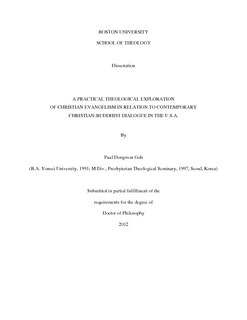A Practical Theological Exploration of Christian Evangelism in Relation to Contemporary Christian-Buddhist Dialogue in the U.S.A.
A Practical Theological Exploration of Christian Evangelism in Relation to Contemporary Christian-Buddhist Dialogue in the U.S.A.

View
goh_dongwon_ph...pdfMain dissertation
Download
goh_dongwon_ph...pdf (1.389Mb)Main dissertation
Date Issued2012-05-09
Author(s)
Goh, Paul Dongwon
Export Citation
Download to BibTex
Download to EndNote/RefMan (RIS)
MetadataShow full item record
Permanent Linkhttps://hdl.handle.net/2144/3741
This dissertation, informed and shaped by Christian-Buddhist encounter and dialogue in the United States at the beginning of the twenty-first century, seeks to contribute to a reconstruction of the theology and practice of Christian evangelism as a form of contemplative spiritual guidance.
By examining qualitative data from a study of the interreligious experiences of Christian-Buddhist practitioners and spiritual seekers, and by placing that data in conversation with several current theologies of evangelism, this project in practical theology explores how the theology and practice of evangelism can be enhanced by a deeper responsiveness to religious pluralism in general, and Christian-Buddhist engagement in particular.
The dissertation recommends
- a practical theology of evangelism in correlation with Christian-Buddhist dialogue;
- engagement in interreligious dialogue as a virtuous Christian practice;
- recovery and renewal of contemplative spirituality as a source of evangelism; and
- transformation of evangelism as contemplative spiritual guidance.
By providing empirical data from in-depth interviews and participant observation, and by analyzing texts from the Roman Catholic Church and the World Council of Churches, this study advances current theological debate while seeking to move beyond the standard threefold typology used by theologians to construct a theology of inter-religious engagement: exclusivism, inclusivism, and pluralism.
The dissertation concludes that exclusivists too often disregard the lived experiences of interreligious practitioners and fail to address important practical theological questions that surface in the relations between interreligious dialogue and Christian evangelism.
Conversely, emerging proposals to adopt a pluralist approach toward other religions and to construe evangelism as merely “interreligious dialogue” is inadequate to the invitational aims of evangelistic practice.
The analysis of selected theological texts reveals creative tension between interreligious dialogue and evangelizing mission.
While such tension causes confusion and suspicion from inside and outside of the church, it is also indicative of the possibility of mutual enrichment and transformation through a reflexive relationship.
Qualitative analysis of in-depth interviews with ten Christian-Buddhist practitioners and spiritual seekers, along with participant observation at a Christian-Buddhist retreat center reveals a profound spiritual hunger for experiencing God, who is both transcendental and immanent, and the inadequacy of propositional presentations of the Gospel in a postmodern and religiously plural context.
Collections
